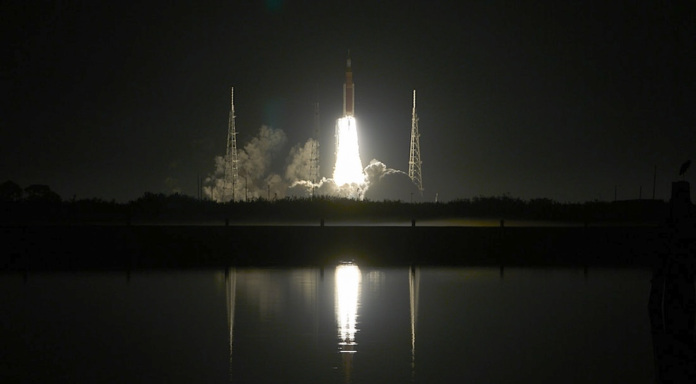KENNEDY SPACE CENTER, Fla. — After years of delays, NASA’s Space Launch System lifted off for the first time Nov. 16, sending an uncrewed Orion spacecraft on a shakedown cruise around the moon.
The SLS lifted off from Launch Complex 39B here at 1:47 a.m. Eastern. The rocket’s upper stage, called the Interim Cryogenic Propulsion Stage (ICPS), separated from the core stage eight and a half minutes after liftoff. The Orion spacecraft will separate from the ICPS two hours and five minutes after liftoff, after the stage completes a translunar injection burn.
The launch took place more than 40 minutes into a two-hour window after overcoming two issues during the countdown. A little more than three hours before the opening of the launch window, NASA reported a leak in a valve in ground equipment used to replenish the core stage’s liquid hydrogen tank. The launch director dispatched a small “red crew” to the pad to tighten bolts in the valve, fixing the leak.
Around the time the red crew completed its work, the U.S. Space Force, which operates the Eastern Range that includes KSC, said a radar needed to track the launch had malfunctioned, a problem traced to a faulty Ethernet switch. Replacing the switch took more than an hour.
The successful launch came after two scrubbed attempts in late August and early September. The first, Aug. 29, was called off when sensors indicated one of four RS-25 core stage engines had not properly cooled down, a problem later blamed on a faulty sensor. NASA scrubbed the second, Sept. 3, after detecting a hydrogen leak during fueling of the core stage.
NASA replaced damaged seals in the liquid hydrogen line and changed tanking procedures, which it successfully tested Sept. 21. However, Hurricane Ian forced NASA to send the SLS back to the safety of the Vehicle Assembly Building before making another attempt in a launch period that closed in early October.
NASA rolled the SLS back to the pad Nov. 4, then had to wait as Hurricane Nicole passed through Nov. 10. The storm caused “very minor” damage that mission managers concluded either could be repaired or was not a constraint to launch.
Those scrubs, though, were only minor setbacks for a launch vehicle whose development suffered extensive delays. The 2010 NASA Authorization Act, which instructed NASA to develop SLS, called for the vehicle to be ready by the end of 2016. Various technical issues, primarily with the rocket’s core stage, steadily pushed back the first flight of the vehicle until now.
The Artemis 1 mission will see the Orion spacecraft, without astronauts on board, go to the moon and enter a distant retrograde orbit there. Orion will remain in that orbit for five days, reaching a maximum distance the Earth of 480,500 kilometers. It will then depart the orbit and return to Earth, splashing down off the coast of San Diego, California, at 12:40 p.m. Eastern Dec. 11.
The 25-day mission is considered a “short-class” mission by NASA, versus missions of up to 42 days that Orion would have flown in two earlier launch attempts. The shorter mission will still achieve all the test objectives, but in a more compressed timeframe.
“We did proofs of concept early on to demonstrate that you can fit all the objects the program has decided they want us to accomplish into the shortest class mission,” said Emily Nelson, NASA chief flight director, in a Nov. 14 interview. “But, it’s much more of a Tetris puzzle to make sure all of those things fit in.”
Those plans are revised for each launch opportunity. “Each different launch opportunity is a new challenge in terms of when is the spacecraft in the right place to accomplish those different mission objectives,” she said.
Artemis 1 is designed to test the Orion spacecraft in cislunar space, including testing the spacecraft’s heat shield when reentering at lunar return velocities. It will be followed by Artemis 2, the first crewed Orion mission, no earlier than 2024.




